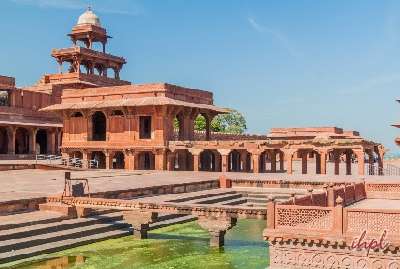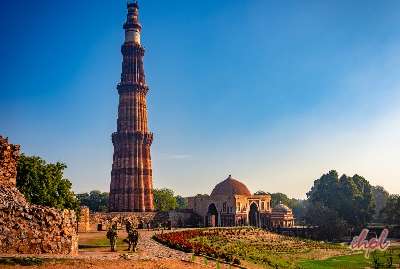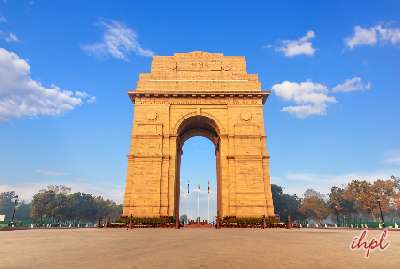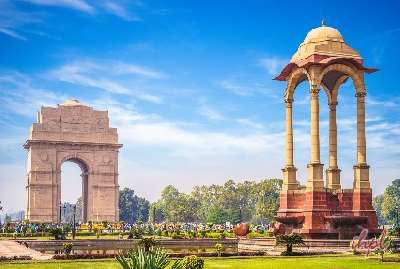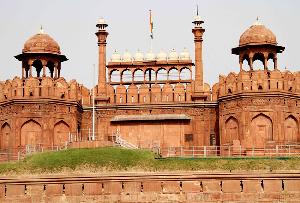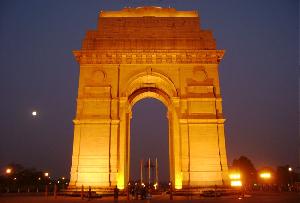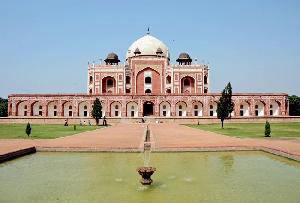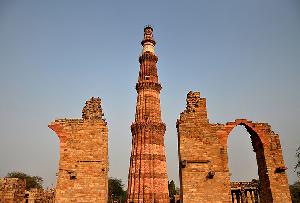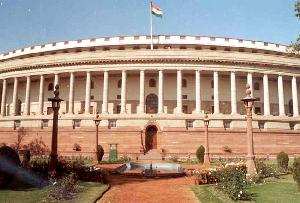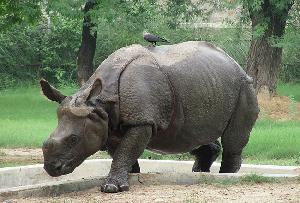Chhatarpur Mandir in Delhi is credited with the honor of being one of the largest and most popular Hindu temples of the capital. The temple is located on the main Guragon-Mehrauli Road, a mere 4km. drive-away from the Qutab Minar complex. The immense premises of the temple create a blissful, placid and serene ambience.
- The temple is entirely built with white marble and is richly embellished.
- Built in the south Indian style, the temple complex is spread over a large area with beautifully manicured lawns and gardens.
- The main sanctum sanctorum of the temple is dedicated to the Goddess Durga.
- The temple complex has many temples dedicated to several deities like Lord Shiva, Lord Vishnu, Goddess Lakshmi, Lord Ganesha and Lord Rama.
- The atmosphere of the temple exudes a spiritual charm as discourses and prayers are performed round the clock. Even the devotees can participate freely in these rituals.
- People from all corners of the country throng the temple during Durga Puja days to offer prayers. The festival of Navratri also draws a big crowd.
- There is a tree tied with many threads and colorful bangles. According to the belief, tying a thread or bangle on the tree fulfils the wishes of the devotees.
- It is customary to wash one’s feet, hands and mouth with water from the tap just outside the temple before entering it. Visitors are supposed to remove their shoes outside the temple.
Architecture:
Chhatarpur Mandir in Delhi is one of the largest and most popular Hindu temples of the capital. The temple is located on the main Guragon-Mehrauli Road, a mere 4km. drive-away from the Qutab Minar complex.
- It is a huge temple complex that combines both the South and North Indian style of architecture.
- The temple is a classic example of modern temple architecture that manifests lavish use of marbles in its construction.
- The temple complex is spread over a large area with beautifully manicured lawns and gardens.
- The richly embellished main sanctum sanctorum of the temple is dedicated to the Goddess Durga.
- The temple complex has many temples dedicated to several deities like Lord Shiva, Lord Vishnu, Goddess Lakshmi, Lord Ganesha and Lord Rama.
Fast – Facts:
Here are some facts about the Chhatarpur Mandir which would help you to have a quick glance of this famous temple in Delhi. Also, this will make it a lot more convenient for you.
Location
Chhatarpur Mandir is located on the main Guragon-Mehrauli Road, a mere 4km. drive-away from the Qutab Minar complex.
Special Feature
According to the belief, tying a thread or bangle on the tree outside the temple fulfils the wishes of the devotees.
How to Reach
Chhatarpur Mandir being located in the capital city, can be reached from any corner of the country. Nearest International Airport: Indira Gandhi International Airport
Nearest Railway Station: Nizamuddin Railway Station
Nearest Metro Station: Central Secretariat
Nearest Bus Stop: Local buses from various points
Nearby Attractions:
The places nearby the Chhatarpur Mandir are some of the most popular tourist spots in Delhi. If you are planning for a visit to this famous temple, keep some time for a trip to these unique sites. Rich in historical and cultural significance, these places are a must-see.
Nearby Attractions of Chhatarpur Mandir in Delhi are Alai-Darwaza, Quwwatul-Islam Mosque, Iron Pillar, Alai Minar, Tomb of Iltutmish, Imam Zamin’s Tomb and Ala-ud-Din Madarsa.
Alai-Darwaza
It is a majestic gateway built by Ala-ud-din Khilji of the Delhi Sultanate. The exquisite inlaid marble decorations and latticed stone screens are stunning even today.
Quwwatul-Islam Mosque
The construction of this mosque known as ‘Might of Islam’ was begun by Qutbuddin Aibak in AD 1192 to celebrate his master, Mohammed Ghuri’s victory over the Rajputs. It is the oldest surviving mosque in India.
Iron Pillar
It stands at the center of the Quwwatul Mosque and dates back to the 4th c A.D. The pillar bears an inscription which states that it was set up as a flagstaff in honor of the Hindu god, Vishnu, and in the memory of the Gupta King Chandragupta II.
Alai Minar
Alai Minar stands as the testimony of Ala-ud-din’s dream that was never fulfilled. This victory tower, built of red sandstone, rises 27 meters high. It was originally planned to be built along similar lines of Qutab Minar.
Tomb of Iltutmish
Built by Shamsu’d-Din Iltutmish himself in 1235, the tomb resides to the northwest of the Quwwatu’l Islam mosque. Originally, this cenotaph was covered by a dome which later was replaced by Feroze Shah Tughluq.
Imam Zamin’s Tomb
The tomb of Imam Zamin is located in the Quwwatul Islam Shrine complex. Imam Zamin was a saint from Turkestan, who settled in India in around 1500.
Ala-ud-Din Madarsa
To the southwest of the Quwwat-ul-Islam mosque lie some rooms and halls in ruins creating an L-shaped block. According to history, these are Ala-ud-Din’s tomb and college or ‘madrasa’, with rows of arched bays and rooms. The madrasa was started by him to impart instructions in Islamic theology and scriptures.
This is not all. The places near the Chhatarpur Mandir have some of the finest places to eat and shop. Thai Wok Ambavata Complex, Osaka Aurobindo Marg, Red Snapper Aurobindo Marg and legions of roadside food stalls near the Qutb complex will give a taste of a lip smacking variety of cuisines. Of course, the dishes typical to Delhi are not to be missed.
Ambavata Shopping Complex, Mehrauli, Hauz Khas Village, Sahara Mall and DT Mall in Gurgaon are famous shopping spots near the Chhatarpur Mandir.



